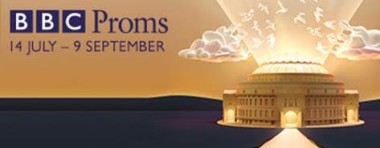
 United Kingdom 2017 BBC PROMS 36 – Schubert, Mahler: BBC Scottish Symphony Orchestra/Thomas Dausgaard (conductor), Royal Albert Hall, London, 12.8.2017. (CC)
United Kingdom 2017 BBC PROMS 36 – Schubert, Mahler: BBC Scottish Symphony Orchestra/Thomas Dausgaard (conductor), Royal Albert Hall, London, 12.8.2017. (CC)
Schubert – Symphony No.8 in B minor, ‘Unfinished’
Mahler – Symphony No.10 in F sharp (completed Cooke)
It was a splendid idea to put two significant “Unfinisheds” together in one evening. And not too long an evening, at that: Dausgaard conducted the first movement of the Schubert in a fresh one-in-a-bar, giving it a palpable urgency. At that speed, one can afford to repeat the exposition, as Dausgaard did; the second subject took on a marked dance-like slant. There was something almost Spring-like about this performance of Schubert’s ‘Unfinished’, especially given the transparency of textures. This was the BBC Scottish Symphony Orchestra on top form, as they were again in the second movement. Again, the music flowed (some of the time, here, Dausgaard did conduct in three: the movement is in 3/8). Thinning the sound to a real pianissimo, almost as if to test the Royal Albert Hall (and its audience), the music took on a remarkably interior slant. Woodwind solos were frequently delightful; the balancing of horns and bassoons was clearly carefully rehearsed. After such a performance, one has to ask, why was the applause instant? A shame, as Schubert’s music had cast its spell over this listener, at least.
Mahler’s Tenth Symphony in the ‘Cooke’ completion really brought in not only Deryck Cooke but also Berthold Goldschmidt (who conducted a performance at the Proms with the London Symphony Orchestra in 1964) and Colin and David Matthews. It is a remarkable edifice which some conductors have famously shunned. Yet it can be a shattering experience: it was featured in one of the two concerts that seemed to led to Stanislaw Skrowaczewski’s appointment at the Hallé Orchestra (it was on that occasion coupled with Mozart’s Symphony No. 29). The piece does seem to bring out the best in the orchestras that tackle it: the Hallé in the Skrowaczewski performance was unrecognisable from the shell James Loughran had left, and here the BBC Scottish Symphony Orchestra sounded almost impossibly confident and controlled. Quite simply, I have never encountered playing from them like it; it was several strata ahead of anything the BBC Symphony has offered for quite some time, with the possible exception of the Bychkov Khovanshchina this year at the Proms (reviewed here by Jim Pritchard).
The heartfelt, elegiac, long melody for violas at the outset was beautifully done; and when the violins entered it was the incredible sense of unanimity and discipline that shone through. Melodic inflection was carefully marked, something which led to the most radiant of counterpoints. True, the BBC Scottish might not have the heft of some orchestras – perhaps that crushing, grinding climax of the first movement could have come across more viscerally – but there is no doubting Dausgaard’s grasp of the score. Daugaard is Chief Conductor of the BBC Scottish, and the rapport was palpable. Excellent solo violin contributions from leader Laura Samuel seemed to add that perfectly Mahlerian touch to the canvas.
The tricky rhythms of the first Scherzo – Mahler with his deconstructionist head on – were superbly done, a reflection perhaps of the unflagging concentration that ran through this performance like a backbone. It was interesting how the trumpet gestures at the close of this movement seemed to link back to the horn gestures closing the second movement of Mahler’s First Symphony (where it all began, you could say). A deliberate parallel made by Dausgaard, I wonder?
The short ‘Purgatorio’ movement found ephemeral strings and light, piping, tripping oboe (Stella McCracken) before the hyper-energetic second Scherzo came into view, full of energy (if not fully daemonic) and boasting a superb, angular trombone solo.
It is difficult not to hear memories of Mahler’s Sixth Symphony in the finale (the tuba solo) over-painted by the sense of valediction of the ‘Abschied”’movement of Das Lied von der Erde. But how Mahler, his orchestrators/completors and Dausgaard took this further, through the portal that ends both of those works to the sweet, tender song of the later stages, was what marked out this interpretation. Dausgaard’s careful insistence on pianissimos and even lower dynamics truly paid off here, and it is a testament to the standard of the BBC Scottish under his leadership that the orchestra can delivers what he asks of them. A special mention for the principal flute, Charlotte Ashton, perhaps; and principal trumpet, Mark O’Keeffe, who held that long, piercing note through those huge climactic chords of the first movement. The symphony left its mark most tellingly in ripples of silence after Dausgaard successfully sustained the intensity of the finale.
Dausgaard has, of course, recently recorded the Mahler with the Seattle Symphony, which on the present evidence would be well worth seeking out. I do wish the Proms audience wouldn’t applaud after every movement, though …. only the drum strokes of the finale prevented this between the final two movements of the Mahler. That gripe over, this was a simply remarkable performance; and how apt that the Albert Hall should be packed to the rafters for this concert. A clear season highlight.
Colin Clarke
